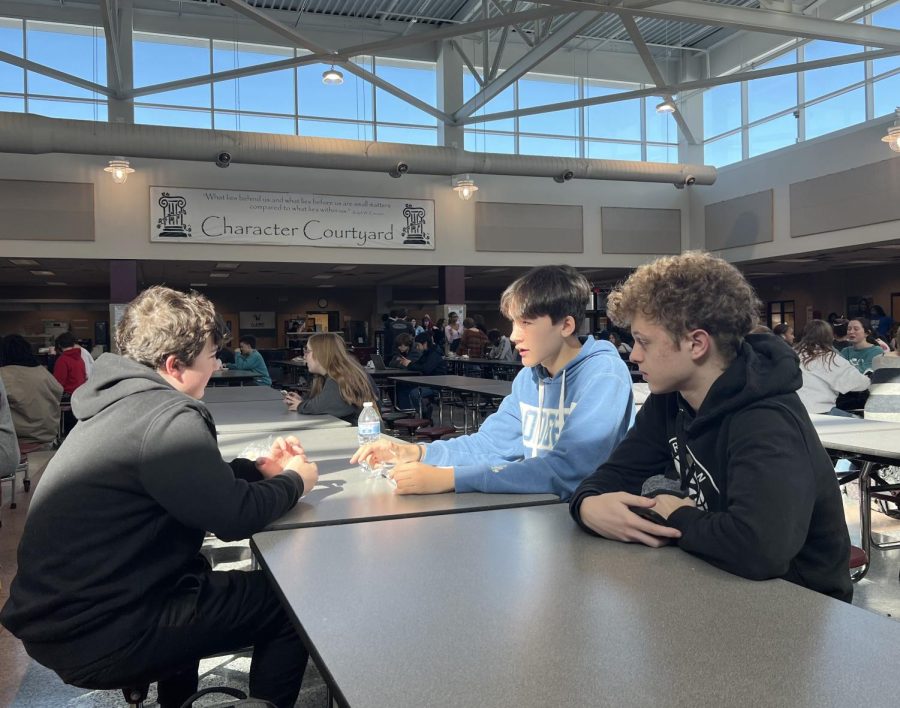Wakefield’s wallflower project encourages students to socialize beyond their comfort
Staff Photo by Danielle Kirschner
Austin Won from Mr. Calabria’s Speech class sits among new friends. Won was conducting a social experiment for the class.
December 19, 2022
Students are constantly on their cellular devices, whether for school, personal entertainment or communication. The most common use of devices is for social media, which can have many positive but also many negative effects on social skills. Having the ability to communicate with friends and family is a fantastic aspect of social media, but if used excessively it comes to a point where people can start to lose their social skills.
English teacher Tony Calabria, believes the pandemic is a large factor in the loss of social skills and the reversion to the easier option, cell phones. Calabria teaches a speech class at Wakefield and founded the student initiative, The Wallflower Project. This assignment was a social experiment for the students to channel their inner wallflower.
“The definition of a ‘wallflower’ is someone who literally stands up against the wall or stands by themselves and does not engage but will engage if talked to,” Calabria said.
The experiment worked by having students calmly sit down at a randomly selected lunch table without engaging in conversations with those sitting there. Everyday the student would engage slightly more with the people at the lunch table, however, would still remain calm and collected. The goal of the experiment was to see if the other lunch table people would be friendly toward the new student in the group environment.
Calabria’s inspiration for this project was for his students to bring a friendly face into the cafeteria for others to feel welcome, considering we live in an age where most kids are engulfed in their phones.
“I wanted my students to bring kindness into the cafeteria, which can be stressful at times for people who escape [reality] on their phones. That’s [why] people play with their phones, it’s nice and relaxing during lunch,” Calabria said. “But sometimes people use it because they have nothing to do. So I wanted to give them an option to hangout with others, talk to them and just find something else to do.”
During the initiation of the project, one of Calabria’s students, Ashton Swartzel, was originally terrified by the assignment.
“Initially, I thought it was going be an opportunity to get bullied. I thought it was going to be scary,” Swartzel said. “I have always been lucky to be in a friend group and I really wanted to feel that different experience.”
The experience of those participating in the experiment had many positive benefits. School counselor, Melissa Ansbacher, gives advice on how restricting yourself can have negative effects on your mental health.
“People who only do what’s comfortable or familiar [in my opinion] limit their capacity to grow,” Ansbacher said. “They limit possibilities and opportunities to become more competent and confident for fear of failure or of something bad happening.”
Ayushi Mohanty is another student of Calabria’s who was a part of the wallflower assignment. Although the experience started out rough for Mohanty, by the end of it she realized how impactful the experiment was.
¨Today was the last day of the experiment and it was surprisingly emotional because I got along with them very well,” Mohanty said.
All participants had a new goal coming out of this project. Every student was able to learn something positively impactful and was able to gain valuable traits including treating people with kindness. Calabria wanted to keep influencing his students to spread positivity, and positively influenced all students to continue pushing themselves to spread kindness.
“A person may feel as though they’re no longer alone in an experience when they previously might have. Humans are social creatures,” Ansbacher said. “Meeting others can help us not feel lonely, which is different than being alone.¨









